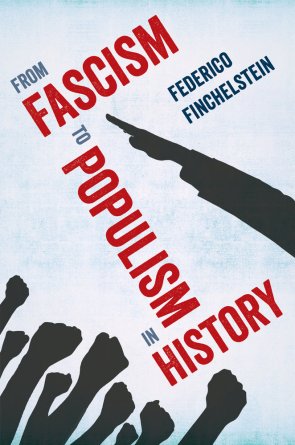From Fascism to Populism in History: Federico Finchelstein’s New Book
For New School for Social Research Professor of History Federico Finchelstein, the present-day stakes of engaging with the history of populism could not be more critical.
As Finchelstein puts it in his new book, From Fascism to Populism in History (University of California Press), “Populism’s past challenges to egalitarian forms of democracy continue in the present and are now threatening the future of our own democratic times.” He contends that a historical understanding of modern populism—whose roots he also traces back to the earliest days of twentieth century fascism—has become critical in any analysis of contemporary politics.
Differently put, our capacity to respond to the challenges presented by populism depends crucially upon our willingness and ability to acknowledge and process the lessons of history.
Having grown up under military dictatorship in Argentina, and having studied various forms of authoritarianism throughout his career as an academic, Finchelstein finds it surprising that his work has gained such sudden and urgent relevance in the United States and around the world. With the election of Donald J. Trump to the Presidency, Finchelstein suggests that the United States has become the global leader of populism. But it is hardly alone in grappling with populist movements, marking only the most recent in a long string of developments around the world. From Nicolás Maduro in Venezuela and Recep Tayyip Erdoğan in Turkey, to Brexit, Germany’s Alternative für Deutschland and France’s National Front—among many others—populism is on the march around the world.
 At the same time, it is the 2016 presidential election and the success of populism in the United States that most intrigued Finchelstein, at the very least because President Trump represents the first modern populist to hold the office here. “I never thought these issues would hit so close to my home in New York,” he said in a recent conversation with Research Matters. Reflecting on his longtime commitment to researching the history of fascism and populism, Finchelstein recalled his feelings about the intellectual legacy of The New School upon his arrival in 2006. “The New School for Social Research was founded not only on the idea that there was an academic need to resist fascism,” he said, “but also a need to understand it.”
At the same time, it is the 2016 presidential election and the success of populism in the United States that most intrigued Finchelstein, at the very least because President Trump represents the first modern populist to hold the office here. “I never thought these issues would hit so close to my home in New York,” he said in a recent conversation with Research Matters. Reflecting on his longtime commitment to researching the history of fascism and populism, Finchelstein recalled his feelings about the intellectual legacy of The New School upon his arrival in 2006. “The New School for Social Research was founded not only on the idea that there was an academic need to resist fascism,” he said, “but also a need to understand it.”
To this tradition of scholarship, Finchelstein brings a distinctive approach to an examination of populism “from the margins,” integrating perspectives from the Global South that commonly remain outside Eurocentric historical narratives about populism’s emergence as a political force. For example, he reminds readers that Argentina’s Juan Perón became the first populist leader to reach power in the postwar era, becoming an example of how to do things for subsequent generations of populists in Latin America and elsewhere. In the subtext of his genealogy of populism, Finchelstein points to an unmistakable through line back to fascism—a line that similarly goes unaddressed in extant scholarship on populism. “Many interpreters of populism have a limited understanding of the historical and genealogical connections between populism and fascism,” Finchelstein explained. “They collapse important historical distinctions and different historical contexts, as well as continuities.”
From Fascism to Populism in History addresses precisely these contextual differences and continuities, providing a nuanced vocabulary for describing the particular ambitions of present-day populists and carefully articulating what it inherits from fascism. “In history,” Finchelstein writes, “fascism was a political ideology that encompassed totalitarianism, state terrorism, imperialism, racism, and, in Germany’s case, the most radical genocide of the last century: the Holocaust.” He adds that its central aim was “to destroy democracy from within to create a modern dictatorship from above.” Although populists often attract what Finchelstein calls “neofascist fellow travelers”—particularly when it comes to the definition of “the people” in ethnic, national, and racial terms—he emphasizes that they typically aim to, “reshape democracy in [an] authoritarian fashion without fully destroying it.” The result might not look like the dissolution of democratic rule, but nevertheless often represents a significant erosion of democratic institutions.
